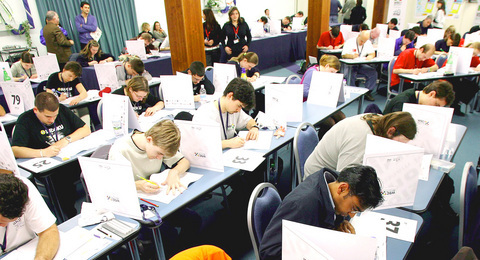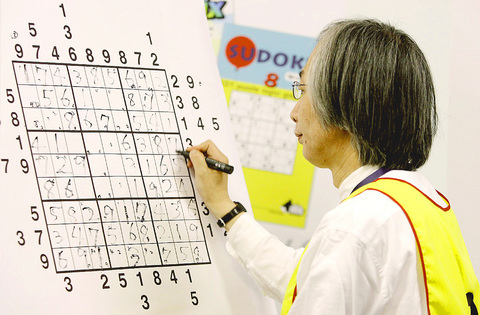The Sudoku craze added another chapter in its phenomenal development last weekend when the gripping number puzzle made its debut as a spectator sport at its inaugural world championships in Italy.
Jana Tylova, a 31-year-old accountant from the Czech Republic, was crowned the queen of Sudoku on Saturday after beating off the challenge of two Americans in a frenetic final round of the two-day event which drew 85 contestants from 22 countries.
But it was the manner of her victory, as she hastily scrawled numbers on a flip chart in front of a room full of tense supporters and spectators, which struck Wayne Gould, the jovial New Zealander known as Suduko's "guru" since transforming the ancient puzzle into a worldwide craze.

PHOTO: AFP
Watching people think doesn't suggest a spectator sport with lasting appeal, but Gould sees the potential of the flip charts, which he had never seen used before in Sudoku.
One of the Americans, Thomas Snyder, found the unaccustomed attention a little offputting.
"It's something new that I have not done. It was a little distracting standing up in public and having all those photographers trying to get you from every angle, from the front, from behind. etc."

PHOTO: AFP
Gould's advice is that he should get used to it, as the Sudoku craze is here to stay: "I can see the day when video cameras could be fixed to the top of the flip charts.
"It doesn't really suggest itself as a spectator sport, but look at darts," he said, referring to top viewer ratings in Britain for televised darts tournaments.
"It could be like watching grand masters playing chess, only with more action," he said.
Tylova's victory was something of a surprise as she finished only ninth after the first round -- the only woman in the top 18.
Women made up around 30 percent of the competitors and that ratio held true to the end, when the quiet Eastern European joined the two confident, chatty Americans -- Snyder, a 26-year old chemistry graduate student at Harvard University, and Huang Wei-ha, 30, a software engineer at Google.
"These guys are quite exceptional. They're practically off the planet," Gould said. "I can't begin to understand how they do the puzzles. It's all a bit too stressful and serious for me!"
The three finalists, and many of those they left in their wake, are what World Puzzle Championship inventor Will Shortz calls "top solvers." All are veterans of his annual championship in the US.
The fiendishly difficult puzzles ranged from classic Sudoku -- the familiar newspaper style grid of three-by-three boxes -- to more celebral variations such as mechanical Sudoku and extra-regions Sudoku, all worked out against the clock.
Shy or not, Tylova's life is about to change as the new "sport" in which she excels continues to grow.
According to Gould, a 60-year-old retired judge, the impact of her win will be "huge."
Gould said earlier, before the final, that the victory would impact on the winner "more than he realizes. When he dies they'll put in his obituary that he was the first ever world champion.
"He'll just have to open is mouth and say something stupid and people will think it was clever."
Journalists managed to draw a predictable declaration of gender equality from the new champion.
"There is no difference between men and women and I tried to prove that even in logic, men and women are on the same level," she said to loud cheers.
Her tips for enthusiasts was to practise more -- she manages two hours a day when not working or riding her showjumping horse -- and keep up to date with the better Sudoku Web sites.
And there lies the future of Sudoku. Gould says he has made most of his US$1 million from Sudoku via his Web site www.sudoku.com and from his puzzle books.
Will Shortz has caught the wave of Sudoku in the US after Gould popularized it in Britain via the London Times in November 2004, and now has five Sudoku books in the top 150 titles on the current USA Today bestseller list.
"Sudoku is building up a new interest in puzzles and attracting people who didn't do crosswords, but there's a big crossover," Shortz said in Lucca.
"Sudoku is more popular with younger people. You don't have to know anything basically to do it, just the nine numbers. An eight year-old can do it."
Shortz has made "enigmatology" -- the study of puzzles of all kinds -- popular, having parlayed a love of puzzles into a university degree and a lucrative career.

By 1971, heroin and opium use among US troops fighting in Vietnam had reached epidemic proportions, with 42 percent of American servicemen saying they’d tried opioids at least once and around 20 percent claiming some level of addiction, according to the US Department of Defense. Though heroin use by US troops has been little discussed in the context of Taiwan, these and other drugs — produced in part by rogue Chinese Nationalist Party (KMT) armies then in Thailand and Myanmar — also spread to US military bases on the island, where soldiers were often stoned or high. American military policeman

Under pressure, President William Lai (賴清德) has enacted his first cabinet reshuffle. Whether it will be enough to staunch the bleeding remains to be seen. Cabinet members in the Executive Yuan almost always end up as sacrificial lambs, especially those appointed early in a president’s term. When presidents are under pressure, the cabinet is reshuffled. This is not unique to any party or president; this is the custom. This is the case in many democracies, especially parliamentary ones. In Taiwan, constitutionally the president presides over the heads of the five branches of government, each of which is confusingly translated as “president”

An attempt to promote friendship between Japan and countries in Africa has transformed into a xenophobic row about migration after inaccurate media reports suggested the scheme would lead to a “flood of immigrants.” The controversy erupted after the Japan International Cooperation Agency, or JICA, said this month it had designated four Japanese cities as “Africa hometowns” for partner countries in Africa: Mozambique, Nigeria, Ghana and Tanzania. The program, announced at the end of an international conference on African development in Yokohama, will involve personnel exchanges and events to foster closer ties between the four regional Japanese cities — Imabari, Kisarazu, Sanjo and

Sept. 1 to Sept. 7 In 1899, Kozaburo Hirai became the first documented Japanese to wed a Taiwanese under colonial rule. The soldier was partly motivated by the government’s policy of assimilating the Taiwanese population through intermarriage. While his friends and family disapproved and even mocked him, the marriage endured. By 1930, when his story appeared in Tales of Virtuous Deeds in Taiwan, Hirai had settled in his wife’s rural Changhua hometown, farming the land and integrating into local society. Similarly, Aiko Fujii, who married into the prominent Wufeng Lin Family (霧峰林家) in 1927, quickly learned Hoklo (commonly known as Taiwanese) and